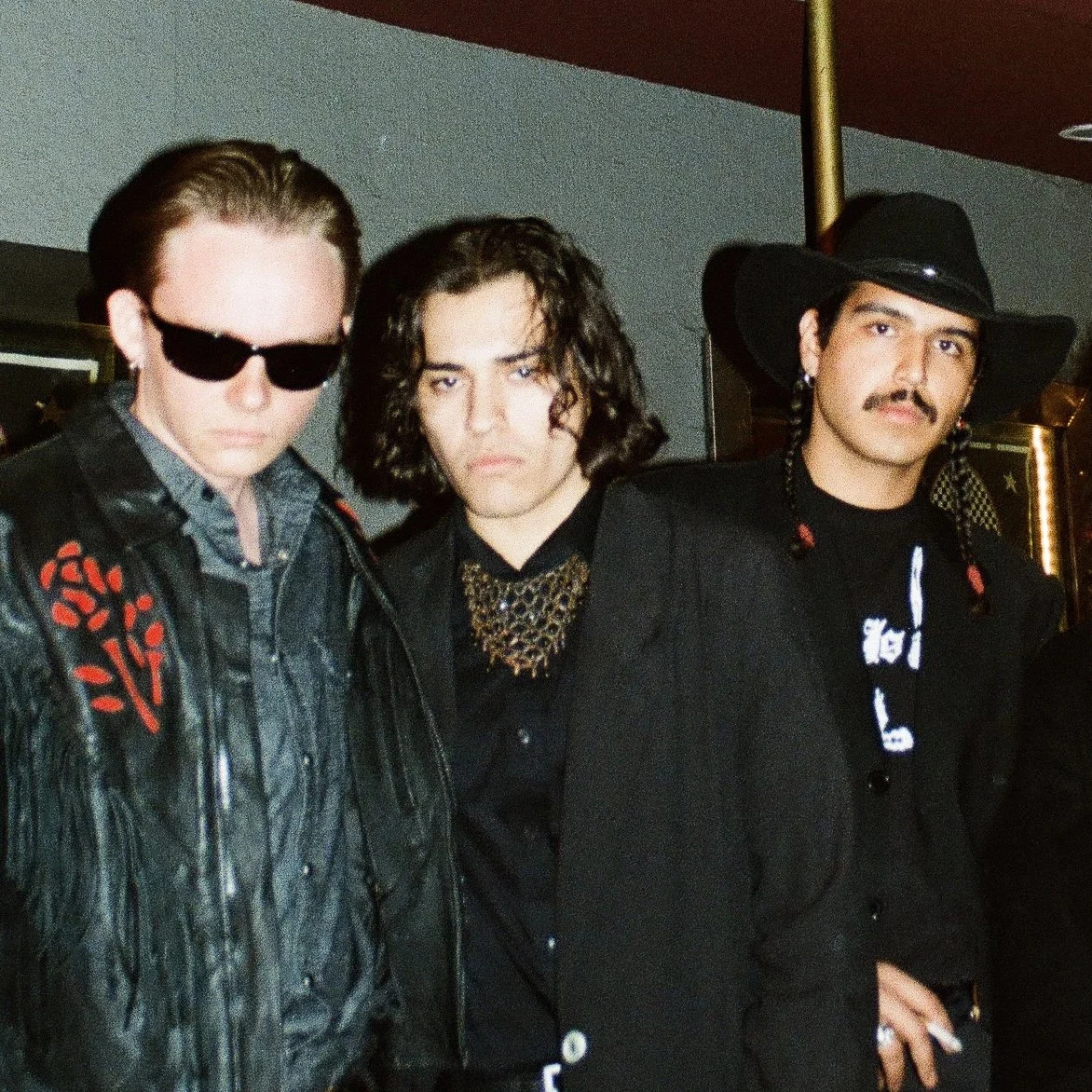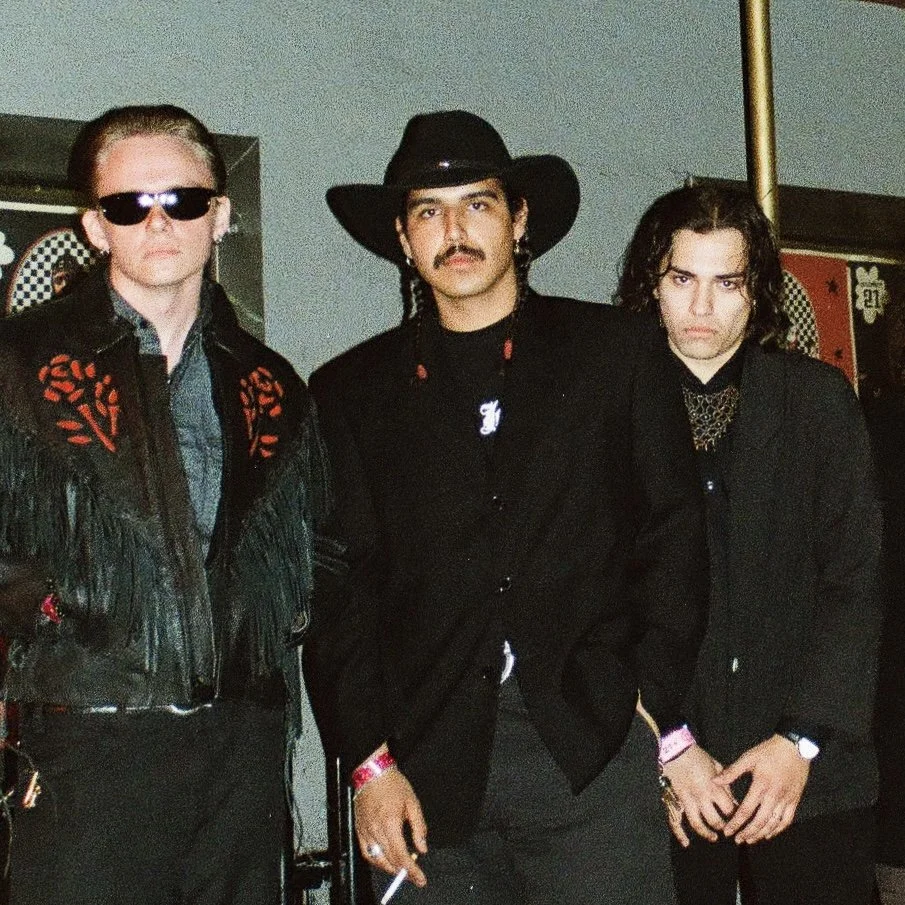Q&A: Israel’s Arcade Combine Poetry and Grit in Sophomore Album, ‘Pray For Rain’
Coachella Valley rockers Israel’s Arcade make a powerful return with their sophomore album, Pray For Rain. Spanning 11 tracks, the record serves as a metaphor for rare desert rain, a symbol of hope in desolate moments. Each track proudly stands on its own, showcasing a dynamic journey of heavy guitars and deeply introspective tones. Pleaser sat down with lead singer Israel Pinedo to discuss the making of Pray For Rain, the band’s newfound collaboration and more.
PHOTOS BY WENDY ROSALES
PLEASER: The creation of Pray For Rain began in Joshua Tree, CA, and you and your bandmates rented a space there for a week to make music. What was that experience like, and what did you learn about yourselves in the process?
ISRAEL PINEDO: The sole purpose of going out to Joshua Tree was just to write music. I don't even know if we were thinking about writing an album; we just wanted to write as many songs as we could. So, we got this Airbnb that was in the middle of nowhere in the desert, and we turned this Airbnb into our studio. We sat in a circle. I told everybody to bring in an idea, whether it be a chord progression or a synth sound or whatever, and we'll build off of that and make it into a song. We ended up coming up with a lot of ideas, I want to say up to 15 ideas, and then those became songs, and then I, later on, finished writing them and arranging them and put the lyrics in.
We're from the desert, but where we live, it's an actual little town. So being out there was what we've always experienced, but on steroids. Just heightened. It was really eye-opening because I got to appreciate the desert more and got to see the beauty within a desolate place. It also just helped us get closer, I think. We got drunk together, and we cried together, and laughed together and ate together.
This album is meant to symbolize the glimmer of hope found in low moments. Can you elaborate on this idea?
IP: As a kid, I hated where I'm from. I hated the desert because it was so boring and there wasn't anything to do, and there wasn't anything around. And then as I got older, I started to grow more of an appreciation for it. I would just go on hikes in the mountains by myself, and just be away from everybody and everything. If I had a tough day at work, I'd get out super late, and in the middle of the night, I would just go for a hike. It's just quiet. You learn to befriend yourself and your thoughts more.
In the richer parts of the Coachella Valley, it's a lot of old, retired white people, and they come here because it's quiet here. But then we also get a bunch of people who come down here to escape the city and to find themselves here. I think everybody is looking for a similar thing. That's why the album is called Pray For Rain. It's a dry place, and we get rain once every four months, and that's always exciting whenever we get rain, but it also holds the metaphor of praying for some kind of nourishment, whatever it may be.
From your past releases up until now, in what ways has the album brought forth new levels of honesty?
IP: This record is already super unique and true to who we are, just in the sense that we all wrote it. It's the first thing that we ever wrote together and recorded together. Everything else was just stuff that I would record in my room on my laptop. This is the first real collaborative piece of work that we've made together. One of the biggest reasons why I wanted to do that this time around was because I feel like we have such a distinct live sound that I think early on didn’t always translate to the stuff we have on Spotify. I think it sounds very different, our old stuff that we have on music platforms, as opposed to what we sound like live. I’ve always loved how we sounded live, and thought we sounded very strong and powerful, and I wanted to translate that onto this album.
The progression of the album feels like a wave. It begins high-energy, slows back down and picks back up again. Was this intentional?
IP: That was intentional. With our first album, we have a similar vibe where we start off with a really energetic song. I like to think of that as, right off the bat, like a punch in the face, and you grab the listener by the throat. It's intense, and I feel like that's what hooks the listener in and brings them along for the ride. The tempo is slowly going down, and then it slowly comes up again, and I thought that would be cool for engagement purposes, and it tells a story, too. We just played the album live at our album release show this past weekend, and we played the album in the order that it was released, and it actually worked really well. We started off with the high-energy songs, then we slowly brought it down, and people were crowd surfing to our slowest song, which was insane. But it definitely keeps people engaged and brings them along on the journey with us.
Speaking of your album release show, what did it feel like to be able to play some of your most vulnerable songs live?
IP: It was so awesome. This album is the hardest thing I've ever worked on in my life, and with that came a lot of sacrifices and struggles. The show was sold out, and people knew the lyrics to songs that had only been out for a week. Their response was just incredible. It made everything feel so worth it. When the band first started, my idea for it was pretty different than what it is now. I wanted to have fast songs and get mosh pits going at all times, but with this album, [there are] a lot of slower songs, and I didn't know how people were going to react to that. They reacted amazingly to them, and I think that's also partly because our audience is growing up with us. The band started when I was 15, and that's pretty much who would show up to the shows: 15-year-olds, teenagers. Now we have a lot of people who are my age, so I really think we've been growing together.
What are some of your favorite lines from the album?
IP: I really like the first line of the song “Babylon,” which is, “baby, don't let them kill your spirit, because they're all dead.” I'm proud of myself that I was able to convey a feeling that I had across in such a minimal amount of words. Also, if that song was written by another artist, and I was listening to it, I feel like that would be a lyric that would stick with me and make me feel empowered. I hope that's something that happens to anybody who's listening to it.
You’re taking the album out on the road in August. What are you most looking forward to on this upcoming tour?
IP: This is our first headlining tour, and our first tour that we're bringing another band with us to open for us. A lot of these states and cities we've never been to before, so I honestly don’t have the highest expectations. [He laughs] I feel like we’re going to be out there, campaigning around, and whoever shows up is good for me.
I already know the LA, Phoenix and San Diego shows are going to be awesome just because of how Santa Ana responded. I know LA is going to match that, or even more. I'm excited to see that.
What’s the ideal setting for listening to the album?
IP: Once the album was finished, we listened to it when we were on a hike. The sun was going down, and by the time we finished the album, the sun had set, and we were sitting on this mountain overlooking the city. I think that was a perfect setting to listen to it.
The album’s out, listen to it, and I hope you enjoy it. We’re going to have new merch listed on our website that we’re launching soon. Come see us on tour.


